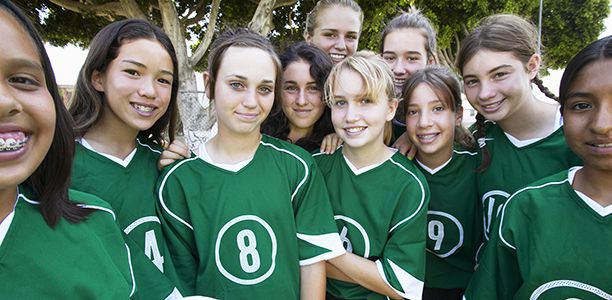A growing number of teenage girls are shying away from sports in high school because Facebook and Instagram are making them self-conscious about their bodies, a new Flinders University study reveals.
The study, led by Associate Professor Claire Drummond, found that adolescent girls are becoming increasingly disengaged in physical activity for a number of reasons, including high levels of body dissatisfaction associated with social media.
The research, which was undertaken from May to August, interviewed 75 girls between the ages of 13 and 17 from five Adelaide schools in a bid to build a better picture of why teenage girls participate – or don’t participate – in sports.
Ultimately, the study aimed to increase understanding of the underlying reasons for adolescent girls’ PA-related decisions by examining psychosocial influences such as attitudes and perceptions, as well as sociocultural influences such as the role of friends and family.
Associate Professor Drummond said there was a strong connection between social media and poor body image, with sites such Facebook and Instragram being “somewhat detrimental” to girls and their perseverance of regular PA.
“A lot of the girls who were interviewed actually spend a fair bit of time on ‘fitspo’ [fitness inspiration] pages. The problem is a lot of these pages contain images of fitness models with six packs and skinny bodies that are completely unattainable to everyday young women,” Associate Professor Drummond, based in the School of Health Sciences, said.
“A lot of the girls said they don’t have the time to look like that so what’s the point in trying,” she said.
“There was a strong feeling of guilt because they didn’t have bodies like the fitness models they follow on social media, and this was particularly evident in the 14-15 age group.”
Among other findings; girls were less likely to engage in school sports activities in the company of adolescent boys, with the research showing a difference between girls who tried new forms of PA at co-ed schools compared with those from single-sexed schools.
While all girls recognised the importance of PA, Professor Drummond said many older adolescents lacked the time to engage in regular PA due to study and work commitments.
“After Year 10, physical education (PE) isn’t compulsory in schools so a lot of the girls dropped it because they felt it wasn’t as important as some of their other studies.
“The ones who were engaging in regular PA tended to stop participating around exam time when they became increasingly time poor, which is a shame because research shows PE can actually help clear your mind and help you study better.”
Associate Professor Drummond said the social aspect of PA was important to girls, and they recognised it alleviated stress, made them feel good and created a sense of achievement.
She said the findings highlighted the need for more research and awareness about the role of social media in shaping girls’ body image, as well as educational incentives to keep girls involved in PE beyond Year 10.
“Girls will disengage in sports when they feel discouraged, self-conscious or when they are being bullied or made to feel embarrassed by a lack of sporting ability.
“While schools are doing the best they can, they need to be aware of the increasing role of social media in shaping girls’ perceptions of their bodies, and the impact this has on their participation in sport.
“Schools could also explore the possibility of running split PE classes at co-ed schools to alleviate the embarrassment girls feel about participating in sports with boys, and look at extra incentives, perhaps through grades, to reward girls who participate in sport, not just on their ability but also on their attempt.”
Associate Professor Drummond presented her findings at the 4th International Conference on Qualitative Research in Sport and Exercise at Loughborough University in the UK earlier this month, and is now writing a paper to be submitted for international publication.
(Source: Flinders University)










